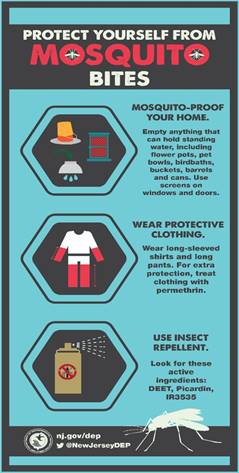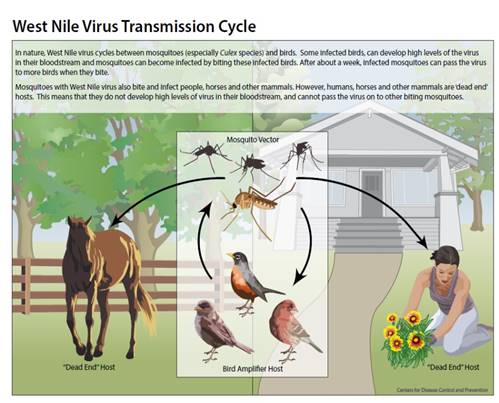|
FOR IMMEDIATE RELEASE |
Contact: Lawrence Hajna (609) 984-1795 |
|
WITH WEST NILE VIRUS CASES AT RECORD LEVEL AND PERSISTENT WARMTH (18/P083) TRENTON – With reports of West Nile virus illnesses in people at a record level and persistent warm and rainy weather, the New Jersey Department of Environmental Protection and New Jersey Department of Health are urging property owners to take steps to reduce mosquito populations and to protect themselves against the risk of mosquito-borne illnesses. “The DEP and the New Jersey Department of Health take mosquito control and disease prevention very seriously,” said Ray Bukowski, the DEP’s Assistant Commissioner for Natural and Historic Resources, which oversees the state’s Office of Mosquito Control Coordination. “Through close tracking in partnership with local health and mosquito control agencies, we are able to focus control efforts to maximize their effectiveness and reduce health risks as much as possible.” “Conditions remain optimal for mosquito breeding and the species of mosquitoes that can carry the virus can breed in even the smallest pools of water – even toys and discarded cups,” said New Jersey Health Commissioner Dr. Shereef Elnahal. “People should empty or throw away anything that can hold water – no matter how small – and be mindful of regularly changing water in bird baths and bowls for pets. It’s also very important to make sure that garbage and recycling receptacles have secure lids to prevent the pooling of water.” New Jersey’s 21 county mosquito-control agencies use a variety of methods to combat mosquitoes, including public awareness campaigns, larval habitat source reduction programs, use of natural predators, water-management techniques and careful application of approved insecticides to manage mosquito populations and reduce the threat of disease transmission. The Department of Health reports that human cases of West Nile Virus this year have reached a record of 34, two of them fatal. A 62-year-old man and an elderly woman, both from Bergen County, passed away in September, after being bitten by infected mosquitoes. Monitoring across the state also indicates record levels of pools producing mosquitoes and mosquitoes carrying West Nile virus. Like all mosquito control agencies, the Bergen County program is using comprehensive mosquito surveillance information to direct control decisions and aggressively treat for mosquitoes in affected areas. These efforts will continue until the threat of further disease transmission has passed. The virus is spread by the bite of a mosquito infected with the West Nile virus. The virus can become amplified in populations of birds, meaning that a mosquito that transmits the virus to a person has bitten a virus-infected bird. This transmission route can also infect animals, often horses.
West Nile virus is not spread from person to person. Many people who become infected do not become ill and may not develop symptoms. About 20 percent of infected people will develop West Nile fever. When symptoms occur, they may be mild or severe. Mild symptoms include flu-like illness with fever, headache, body aches, nausea and sometimes swollen lymph glands or a skin rash on the chest, stomach and back. Symptoms of severe cases of West Nile virus include high fever, neck stiffness and encephalitis, a swelling of the brain that can lead to coma, convulsions and death. Less than one percent of infected people will develop severe symptoms. People over the age of 50 and people with weak immune systems are at greater risk of developing severe illness. Symptoms can appear two to 14 days after being bitten by an infected mosquito. There are no vaccines or specific treatments for most mosquito-borne diseases. Those who think they or a family member has contracted a mosquito-borne disease should call or visit a healthcare provider immediately. Residents, business owners and contractors can take these steps to reduce mosquito populations:
To learn more about the New Jersey Mosquito Control Commission and for links to county commissions, visit www.nj.gov/dep/mosquito For more information on how to prevent mosquito bites and illness, or to mosquito-proof your home and yard, visit http://nj.gov/health/cd/documents/faq/mosquito_checklist.pdf For a New Jersey Department of Health news release on West Nile virus cases this year, visit: https://nj.gov/health/news/2018/approved/20180924a.shtml |
|
 Both agencies are also working coordinating with officials in Bergen County to continue monitoring, tracking and spraying efforts as well as public education. The county recently experienced two West Nile-related deaths.
Both agencies are also working coordinating with officials in Bergen County to continue monitoring, tracking and spraying efforts as well as public education. The county recently experienced two West Nile-related deaths.